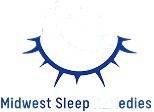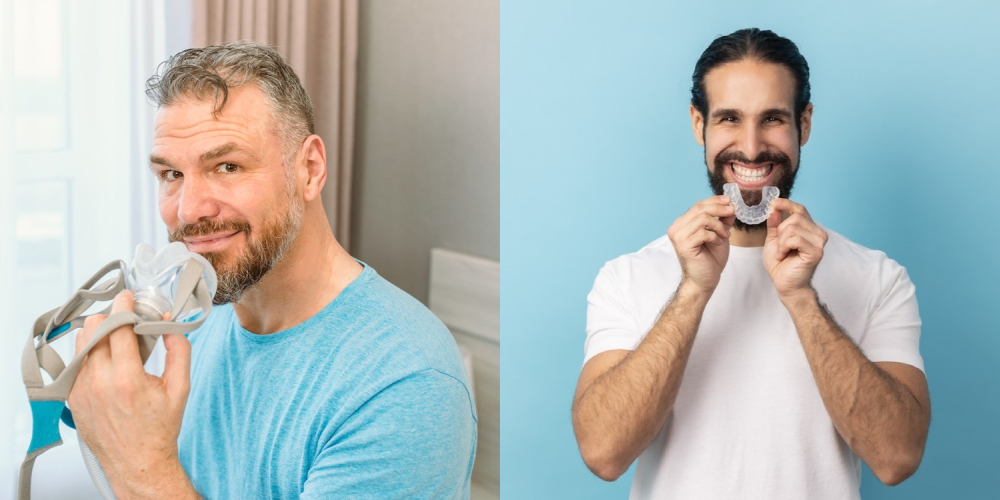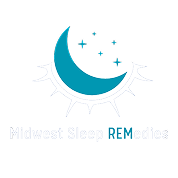Key Takeaways:
- CPAP is the most effective treatment for moderate to severe sleep apnea, but only if used consistently.
- Oral appliances offer greater comfort and portability, making them ideal for mild to moderate cases or travel.
- Treatment choices should consider effectiveness, comfort, lifestyle, and personal compliance.
- Consulting a sleep specialist can help tailor the right solution—sometimes even combining both options.
If you’ve been diagnosed with obstructive sleep apnea (OSA), you’re not alone. Millions of people around the world suffer from this condition, which causes breathing interruptions during sleep. Thus, the consequences can range from chronic fatigue and poor concentration to more serious health risks like heart disease and stroke. Fortunately, effective treatments are available, with CPAP machines and oral appliances being two of the most common options. But when it comes to oral appliance vs CPAP, which treatment is right for you?
In this blog, we’ll explore the key differences between CPAP therapy and oral appliances, and how each works. Moreover, we will go over their pros and cons, and what factors can help you choose the best option for your needs.
Understanding Sleep Apnea
Before diving into the CPAP vs mouth guard debate, let’s briefly look at what sleep apnea is. Obstructive sleep apnea occurs when the muscles in the back of your throat relax too much during sleep, blocking your airway. As a result, these blockages cause repeated awakenings throughout the night as your body struggles to breathe. You may not remember waking up, but the poor sleep quality takes a toll on your health and well-being. All in all, treatment is crucial (either with CPAP or without CPAP), and that’s where sleep apnea mouth guard vs CPAP machines come into the picture.
What Is CPAP Therapy?
CPAP stands for Continuous Positive Airway Pressure. This therapy uses a machine that delivers a steady stream of pressurized air through a mask you wear over your nose or mouth. This air keeps your airway open, preventing the collapse that causes apnea episodes.
Pros of CPAP Therapy
- Highly Effective: Firstly, CPAP is considered the gold standard for treating moderate to severe sleep apnea.
- Customizable Settings: Additionally, pressure settings can be adjusted to suit your specific needs.
- Wide Availability: Lastly, CPAP machines are widely used and supported by sleep specialists.
Cons of CPAP Therapy
- Comfort Issues: Overall, many patients find the mask bulky, noisy, or uncomfortable.
- Dry Mouth and Nasal Congestion: Common side effects include dryness, nosebleeds, or nasal irritation.
- Compliance: Some people stop using their CPAP machines due to discomfort or inconvenience.
Despite these drawbacks, CPAP is extremely effective when used consistently. However, the key word here is “consistently”—and that’s often where compliance becomes an issue.
What Is an Oral Appliance?
An oral appliance, often referred to as a sleep apnea mouth guard, is a custom-fitted device worn in the mouth during sleep. Furthermore, it works by repositioning the lower jaw and tongue slightly forward to keep the airway open.
Pros of Oral Appliances
- Comfort and Convenience: Firstly, it is smaller and more discreet than a CPAP machine.
- Portability: Moreover, it is great for travel; there is no need to pack a bulky machine.
- Better Compliance: All in all, many users find it easier to stick with a mouth guard.
Cons of Oral Appliances
- Not Suitable for Severe Cases: Best for mild to moderate OSA or for those who can’t tolerate CPAP.
- Jaw Discomfort: May cause TMJ issues or tooth movement in some users.
- Less Effective for Everyone: Results can vary, and some people may not see sufficient improvement.
Clearly, when comparing sleep apnea mouth guard vs CPAP, both have their strengths and weaknesses.
Looking for a Comfortable Way to Manage Sleep Apnea?
Discover custom oral appliances designed to treat sleep apnea comfortably and effectively.
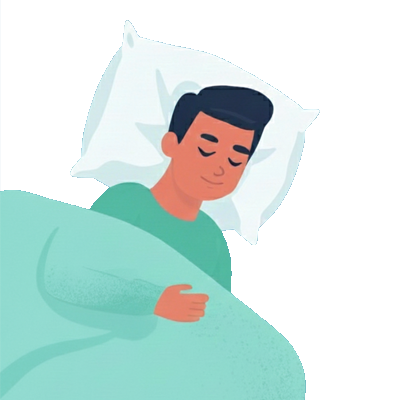
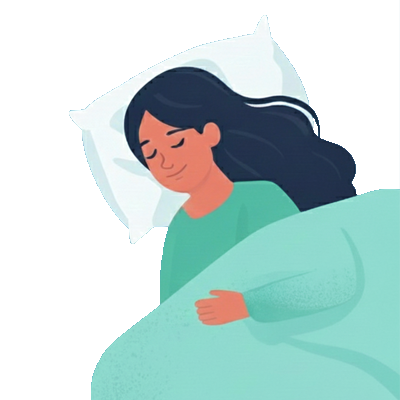


CPAP vs Mouth Guard: How Do They Stack Up?
1. Effectiveness
When it comes to treating moderate to severe sleep apnea, CPAP usually wins hands down. Since the consistent air pressure keeps airways open in virtually all patients. Oral appliances, on the other hand, are generally more effective in mild to moderate cases.
However, effectiveness isn’t just about the theoretical performance of a device. It’s also about whether the patient will use it regularly. Thus, an oral appliance that’s used every night may outperform a CPAP machine gathering dust on your nightstand.
Bottom line: CPAP is more effective, but only if you can tolerate it.
2. Comfort and Ease of Use
Here, oral appliances typically have the edge. Since there’s no need for a mask, tubing, or electric power. Simply pop the device into your mouth before bed and you’re good to go.
Conversely, CPAP requires adjusting to the feel of the mask and the sound of the machine. For light sleepers or those who move around a lot during the night, this can be challenging.
Bottom line: If comfort is a high priority, an oral appliance may be more appealing.
3. Lifestyle and Portability
Are you a frequent traveler? Do you spend nights camping or in locations without easy access to power outlets? If so, lugging around a CPAP machine may not be ideal. Whereas in contrast, a small, lightweight oral appliance fits easily into a pocket or toiletry bag.
Bottom line: For those on the go, the sleep apnea mouth guard wins in terms of convenience.
4. Side Effects and Health Considerations
CPAP therapy can cause issues like dry mouth, nasal congestion, or skin irritation from the mask. On the other hand, oral appliances can lead to jaw pain or dental shifts if not fitted properly. However, these side effects are usually manageable and tend to improve over time or with device adjustments.
Bottom line: Both treatments have side effects, but different ones. Choosing between CPAP vs mouth guard may depend on your sensitivity to these issues.
Making the Right Choice: Factors to Consider
1. Severity of Sleep Apnea
- If you have mild to moderate OSA, either treatment could work well.
- If your OSA is severe, CPAP is likely to be more effective.
2. Personal Preferences and Lifestyle
- Hate the idea of wearing a mask? You might lean toward an oral appliance.
- Prefer a device with adjustable settings and maximum efficacy? CPAP could be better.
3. Compliance and Long-Term Use
- Will you realistically use a CPAP machine every night?
- Do you have the discipline to use and clean an oral appliance consistently?
Being honest about what you’ll stick with is crucial. A less effective treatment that you’ll actually use is better than a more effective one that gathers dust.
4. Cost and Insurance
- CPAP machines often have higher upfront costs but are usually covered by insurance.
- Oral appliances can be less expensive but may require more frequent dental visits and adjustments.
Be sure to check with your provider, as coverage can vary widely.
What Do Sleep Specialists Say?
Most sleep experts agree there’s no one-size-fits-all solution. In many cases, a sleep study and consultation with a sleep medicine specialist or dentist trained in dental sleep medicine can help determine the best option.
Some patients even use combination therapy, a CPAP machine at home, and an oral appliance for travel or backup. This hybrid approach can offer flexibility and maintain continuity of treatment.
Final Thoughts
Choosing between an oral appliance vs CPAP isn’t always easy, but it’s a decision worth making carefully. Both are FDA-approved treatments for sleep apnea and have helped millions of people reclaim restful sleep and better health. If you’ve tried CPAP and can’t tolerate it, don’t give up; an oral appliance might be the solution you need. Conversely, if your sleep apnea is severe, pushing through the adjustment period with a CPAP machine could be life-saving.
Ultimately, your decision should be guided by your medical needs, personal comfort, and lifestyle. Speak to your healthcare provider, weigh your options, and don’t be afraid to try both if necessary. The right treatment is the one you’ll use consistently, and that gets you the sleep you deserve.
Have Questions About Disturbed Sleep?
Don’t wait for the symptoms to get worse. Talk to your doctor, get tested, and take the steps toward better sleep and a healthier life.






